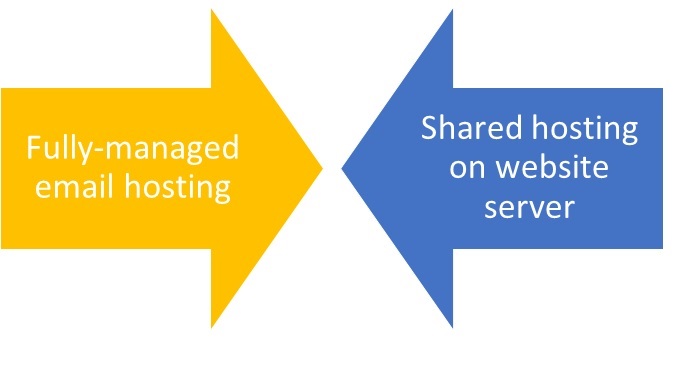While both are online or cloud-based solutions, there is a distinct difference between having your emails hosted on a shared website hosting platform or using a fully-managed email service.
This article makes a side-by-side comparison of the two services. We describe the typical differences a business/user will experience with these services.
For purposes of this article;
Shared hosting refers to where an organization hosts their email on the same server as their website. However, this server is also shared with other organizations that are also using it for similar purposes. In most cases, the organization is expected to manage and support their own account. Additionally, the hosting is also only on one server and lacks redundancies.
A fully-managed email service refers to a cloud-based email service where a third-party email service provider hosts your emails. Here, the service provider commits resources and expertise to manage and maintain email and collaboration infrastructure. In most cases, the email is hosted on multiple servers replicated in different geographical locations for redundancy. There is guaranteed 99.999% email uptime and 24/7/365 support.
Now that we have that out of the way, let’s delve into the common differences between shared hosting and fully-managed email hosting.
1. Email Uptime Guarantee
Unlike in shared hosting, fully-managed email services replicate your emails on one or more sites for redundancy. Therefore, in practice, email uptime guarantee is higher in fully-managed email services.
Shared hosting providers usually have your emails only on one server. If the server goes down (crashes or gets hacked), your email flow goes down with it.
However, a fully-managed email service replicates your emails on multiple sites (servers, geographical locations) for redundancy. Having multiple servers is advantageous because, if the primary server is affected, your emails can be quickly migrated to another server, and your email flow can continue uninterrupted. This failover technology ensures your email is still accessible 99.999% of the time – even in a major disaster.
2. Blacklisting
The likelihood of your domain being blacklisted in a shared hosting environment is higher than in a fully-managed email service.
It is easier for businesses (and spammers) to get on shared hosting because of the low cost of acquisition. Shared hosting, therefore, is a spammers’ haven. The unfortunate thing about being blacklisted on one of these platforms is that it may not be because the spam, virus, or malware originated from your website/users. Instead, it may be from any of the other clients’ websites/emails hosted on the same shared server.
On the other hand, a fully-managed email service deploys sophisticated security tools to monitor email servers. For this reason, it is less likely to be a spammers’ haven. The service provider actively monitors servers to ensure they are free of spam, viruses, malware, phishing, and spoofing threats. The chances that your domain will be blacklisted in a fully-managed email service are lower than in shared hosting.
3. Email performance
You are more likely to experience slow email downloads on shared hosting than with fully-managed email hosting services.
If one or more websites on a shared server get good traffic or experience a spike in traffic, it could slow down the entire server considerably. Resources become stretched during these intervals leading to degraded performance on the server. This, in turn, could slow down your email access.
If your website is receiving very high traffic, or you are frequently getting a ton of bulky email, downloading your emails from the server will become sluggish. Now, consider the irony. You created your website in anticipation that it gains popularity, but when it actually does, it negatively affects your email and gives you headaches!
Conversely, a fully-managed email service is designed to handle large volumes of email traffic or email traffic spikes with no negative impact on the flow of your emails.
4. Email management responsibility and technical support
Fully-managed email services take over the stress of managing your emails.
If your emails are hosted on a shared hosted server, you are responsible for 24*7 monitoring, keeping out the spam, viruses, malware, hackers, monitoring uptime, preventing email spoofing, reducing risks of phishing, and so on. The core business of shared hosting providers is splitting servers for use by many. Because of the low cost of acquiring space on a shared hosting platform, most providers will not dedicate a ton of time to after-sales support. Those who do will most likely charge you extra for this support.
On the flip side, a fully-managed email service costs slightly more because they factor in the resources and technical support needed to take over the management of your organization’s email in its entirety. This includes investing in systems to monitor email servers every second of the day to ensure that your emails are always up and running. These systems detect and anticipate potential points of failure – such as memory running low, hard disk getting full – and deal with them before they affect your email delivery.
A fully-managed email service can quickly detect and shut down any threats on servers even before you report it. Because of this swift response, most times, you may never even notice there was a problem.
5. Security of your business email
Shared hosting is a magnet for hackers. Your emails will generally be more secure in a fully-managed email service than in a shared hosting environment.
The shared hosting platform where your emails are hosted will also have multiple websites on the same server. This simple fact increases the chances of it being hacked because it is a more attractive target. HTML, free WordPress/website plugins, PHP, and other website development languages are easy to exploit. This makes them an easier target for hackers.
Even if your website is up to date and secure, others hosted on the same server might run outdated software, increasing their vulnerability to hackers/exploits. If one of the websites is hacked, there is a high probability that your emails will be affected. In this situation, security measures applied to your own website might not be enough protection for your emails against hackers. A hacker can easily access your confidential business email because of the insecurities of “your neighbor”.
However, more resources are dedicated to security when your email is hosted on a fully-managed email service. Here, servers are always updated with the latest security patches. They run a thin, hardened operating system. They also have email security features like antispam and antivirus. The chances of a hacker exploiting any vulnerabilities on these servers are lower than in a shared hosting environment.
6. Storage/scalability
Fully-managed email services are easier to scale.
Although shared hosting offers unlimited mailboxes, in practice, the total storage allocated is limited per domain. Therefore, even if you decide to create hundreds or thousands of users, you will soon start getting storage space limitation notifications. With time, your emails may start bouncing because your storage space is full. To fix this, your users will be forced to download their emails onto their PCs to create space on the server so that they can receive new emails. This a recipie for disaster because then there is no backup copy of these emails on the server. If anything happens to the emails on the PC, the emails cannot be recovered.
A fully-managed email service is easier to scale. Storage charges are usually per user and can be scaled upwards or downwards as per your needs. Most fully-managed email services also offer between 30-50 GB per user/mailbox. This has been confirmed to be sufficient mailbox space for most users as per industry standards.
7. Collaboration Features
Fully-managed email services have more advanced tools/features for collaboration.
Shared hosting environments do not offer advanced features for collaboration. However, nowadays, some fully-managed email service providers also come with advanced collaboration tools that allow for video/audio/chat calls, file sharing and synchronization, etc.
So which is better for business email – shared hosting or fully-managed email services?
Fully-managed email hosting is comparatively more reliable. Therefore, it is a better choice for organizations for which email downtime would be detrimental to business operations. Your business emails will also be more secure in a fully-managed email environment than in a shared hosting environment. Here’s why.
First, because email is the core focus, fully-managed email services can quickly detect and shut down any threats on servers before you even report it.
Secondly, the fully-managed environment investments in systems to monitor mail servers every second of the day. Therefore, it is possible to detect and anticipate potential points of failure and deal with them before they affect your email delivery. This swift response means that most times, you may never even notice there was a problem.
Thirdly, you are less likely to have your domain blacklisted or your emails hacked on a fully-managed email service than on a shared website hosting platform.
Fourth, unlike in shared hosting, fully-managed email services have multiple servers for redundancy. Your emails are backed up in separate servers to build redundancy. This is advantageous because if one server has an issue, your emails can be migrated to another server, and your email flow continues uninterrupted.
And finally, you are more likely going to have access to collaboration features on a fully-managed email service than in a shared hosting environment.
At MailSafi, we recommend fully-managed email services for businesses. For more information about this or to register for a free trial, please visit our website or get in touch with us for a quote. We are happy to answer any questions you may have about managed email services or any of our services.
![]()





Pingback: Is Your Business Still Using Gmail? Here's Why You Need to Upgrade to a Professional Email
Pingback: What is a Dedicated Email Server and why do you need one? » The MailSafi Blog